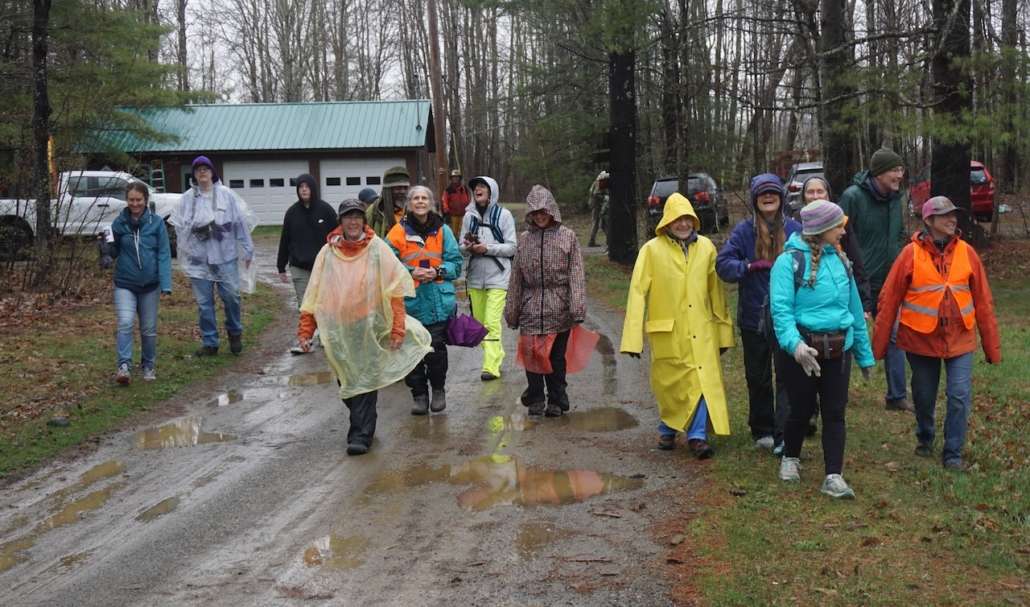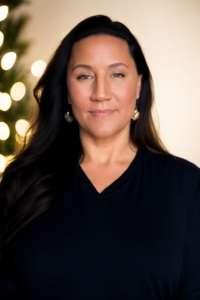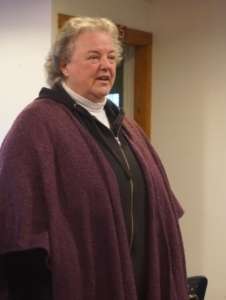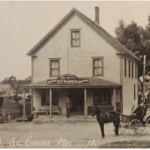Walking toward the world we want to inhabit
A Journey of Peace and Friendship connects communities across Maine
by Eric W. Austin
It was a gray, drizzly afternoon at Friends Camp, in China, but the warmth inside the gathering hall pushed back the gloom. A fire crackled in the hearth as benches were pulled into a loose semicircle around it, and a table in the back with potluck dishes filled the room with the pungent aroma of home-cooked food. About 40 people gathered – some had walked miles that day, others had come simply to welcome them, to share a meal, and to stand together for something bigger than themselves.
This was day six of A Journey of Peace and Friendship, a weeklong walk organized by the Land Peace Foundation, weaving its way from the heart of the Penobscot Nation, at Indian Island, to the State House, in Augusta. When the walkers arrived at Friends Camp, tired but smiling, those inside stepped out to greet them, offering cheers and congratulations. Then everyone came back inside, plates were filled, and stories began to flow – stories of the road behind, the vision ahead, and the hope that simple acts of kindness and connection might help mend a divided world.
A Journey of Peace and Friendship is not a protest march. It isn’t a rally against a policy or a person. Instead, it’s something gentler – and in its way, far more radical. It’s a deliberate choice to walk together, across towns and counties, as a living expression of hope: hope for a more compassionate, more neighborly world.
Organized by the Land Peace Foundation, a nonprofit based in Monroe that focuses on preserving Indigenous lifeways and strengthening Wabanaki kinship and ally networks, the journey invites participants to embody the values they believe in: kindness, mutual care, respect, and connection.
The walk began on April 22, Earth Day, at the Penobscot Nation Boat Landing at Indian Island, and concludes at the Maine State House, in Augusta, on April 29. Each day starts and ends with prayer or reflection, and along the way participants share meals, stories, and song – walking, as the organizers describe it, “toward the world that we most want to inhabit.”
As the Foundation’s mission states, success is measured not by victory over an opponent, but by the quality of the relationships we build – with each other, with the land, and with the generations yet to come. The Journey of Peace and Friendship puts that mission into motion, step by step.
For many of the participants, the walk was not only about making a statement – it was about living their values out loud.
“I was invited to be part of the planning group,” said Andy, one of the organizers from Edgecomb. “There were about 15 of us who met at the Land Peace Foundation. And while there are so many reasons to speak out about the concerns we’re all seeing, one of the things that really resonated with me is Sherri Mitchell’s approach, which is that we should spend 80 percent of our time lifting up the vision of the world we want, and only 20 percent saying what we’re against. That’s what this walk is about.”
That focus on vision, rather than opposition, came through again and again in conversations with the walkers. Sarah, one of the participants, spoke about the need to move beyond fear and division: “It felt like we needed to embody a commitment across cultures, across faiths, rooted in the spirituality of Wabanaki people – to welcome and affirm the sacred in all of us. We need to know our neighbors. We need to do the work not to other people, but with them.”
For Sherri Mitchell, director of the Land Peace Foundation, the idea for the walk came out of conversations within the organization as they wrestled with how to respond to the anger and fear they saw growing around them.
“There were a lot of people feeling really afraid, and a lot of people feeling angry and frustrated,” Mitchell said. “We made a decision that we didn’t want to live oppositionally. We weren’t going to change who we are just to be in opposition to something else. We wanted to create something that was a visual representation of the values we hold – so that people could look out and see that there are those willing to stand up for kindness, for connection, for compassion.”
Along the way, that message has resonated with people from all walks of life – whether they joined for a few steps, waved from their porches, or simply asked what the walk was about.
By the time the walkers reached Friends Camp, in China, on Sunday afternoon, they had already covered many miles in the wind and rain. The day before had been especially rough – steady rain from morning to night – but spirits remained unshaken.
Maggie Edmondson, a former pastor at the Winthrop Center Meeting of Friends, helped guide the gathering. She invited those present to share prayers and reflections, and one by one, people rose to speak – offering words of gratitude, hope, and encouragement for the road ahead.
One of the rituals that framed the gathering was the offering of tobacco to the fire, led by Sherri Mitchell. In Wabanaki tradition, tobacco is considered a sacred plant, used as an offering and a source of spiritual energy. “It’s a way of making connection with the Earth,” Mitchell explained, grounding the ceremony not just in words, but in action – a gesture of respect to the land and the living world around us.
The moment reflected the broader spirit of the walk itself: community gathered not around anger or opposition, but around shared values and care for one another.
The gathering at Friends Camp was one of many such moments along the journey – a space to rest, reflect, and reaffirm the walk’s quiet but determined purpose: to be good neighbors, to practice kindness, and to carry those commitments forward, even when the weather is against you.
The Journey of Peace and Friendship will end where it began – with community. On April 29, walkers will arrive at the Maine State House, in Augusta, for a closing ceremony filled with music, prayer, and reflection, joined by representatives from a range of faith and cultural traditions. But those who’ve taken part in the journey say that the real meaning of the walk isn’t in the destination – it’s in the connections made along the way.
Sherri Mitchell described moments when strangers came out of their homes to wave, to ask questions, or even to join the walk for a short stretch. “There were times when there was an opportunity for hostility to emerge,” she said. “But when people asked, ‘What is this all about?’ and we answered, ‘We’re just walking for peace and friendship,’ they often responded, ‘Well, I guess we need more of that.’”
Those small exchanges, Mitchell said, are where hope begins.
The walkers know they aren’t going to solve the world’s problems in a single week. But what they hope to do is something perhaps just as important: to remind their neighbors – and themselves – that there are still people willing to show up for each other. People willing to believe in the power of kindness, connection, and shared humanity.
“It’s a horrible week for it, weather-wise,” Mitchell joked. “But that’s kind of like life. The real test is whether you can stand up for what you believe in, even when the weather is against you. Will your values remain intact in the storm?”
At Friends Camp, as people gathered by the fire to share food, prayers, and reflections, the answer to that question felt clear. Despite the miles and the rain, despite the divisions that so often dominate headlines, these walkers had chosen another way: to keep moving forward, together.
Responsible journalism is hard work!
It is also expensive!
If you enjoy reading The Town Line and the good news we bring you each week, would you consider a donation to help us continue the work we’re doing?
The Town Line is a 501(c)(3) nonprofit private foundation, and all donations are tax deductible under the Internal Revenue Service code.
To help, please visit our online donation page or mail a check payable to The Town Line, PO Box 89, South China, ME 04358. Your contribution is appreciated!







Leave a Reply
Want to join the discussion?Feel free to contribute!